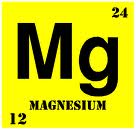Share
 A deficiency in this critical nutrient makes you twice as likely to die as other people, according to a study published in The Journal of Intensive Care Medicine.
A deficiency in this critical nutrient makes you twice as likely to die as other people, according to a study published in The Journal of Intensive Care Medicine.
Low levels of this mineral accounts for a long list of symptoms and diseases.
In the medical literature there are 1000’s of references to the effects of magnesium deficiency.
Magnesium is a critical mineral which is involvd in over 300 enzyme reactions and is found in all of your tissues — but mainly in your bones, muscles, and brain.
You must have magnesium for your cells to make energy and for many different chemical reactions to work, and to help muscles relax.
Most people are deficient in this nutrient and don’t know it. 65 percent of people admitted to the intensive care unit — and about 15 percent of the general population — have magnesium deficiency.
Chronic stress levels lead to a depletion of magnesium.
Since a majority of individulas eat a diet that does not meet the recommended daily allowance for magnesium, the loss of magnesium due to chronic stress is a big problem.
Lower magnesium levels increase the risk of insomnia and poor sleep quality, which in turn raises stress levels. This leads to further loss of magnesium and poorer sleep and higher stress levels.
The Relaxation Mineral
Think of magnesium as the relaxation mineral. Anything that is tight, irritable, crampy, and stiff — whether it is a body part or an even a mood — could be a sign of magnesium deficiency. It is an antidote to stress
The most powerful relaxation mineral available, it can help improve your sleep. In the hospital for life-threatening and emergency situations it is used for herpertension seizures and heart failure.
Are you magnesium deficient?
Consider this if you have the following symptoms of magnesium derficinecy…
- Muscle cramps or twitches
- Insomnia
- Irritability
- Sensitivity to loud noises
- Anxiety
- Palpitations
- Angina
- Constipation
- Anal spasms
- Headaches
- Migraines
- Fibromyalgia
- Chronic fatigue
- Asthma
- Kidney stones
- Diabetes
- Obesity
- Osteoporosis
- High blood pressure
- PMS
- Menstrual cramps
- Irritable bladder
- Irritable bowel syndrome
- Reflux
- Trouble swallowing
- Inflammation and high CRP levels.
Why are we at risk of magnesium deficiency.
The reason we are so deficient is simple: Many of us eat a diet that contains practically no magnesium — a highly-processed, refined diet that is based mostly on white flour, meat, and dairy (all of which have no magnesium).
Magnesium levels are decreased by excess alcohol, salt, coffee, phosphoric acid in colas, profuse sweating, prolonged or intense stress , chronic diarrhea, excessive menstruation, diuretics (water pills), antibiotics and other drugs, and some intestinal parasites.
To determine if you have a magnesium deficiency is difficult.
Measuring the level in the blood is the LEAST sensitive way to detect a drop in your total body magnesium level.
 The BEST way to determine is you are deficient is to add it to your diet and observe the effects.
The BEST way to determine is you are deficient is to add it to your diet and observe the effects.
To properly absorb magnesium we need a lot of it in our diet, plus enough vitamin B6 and selenium to get the job done.
Stop Draining Your Body of Magnesium
- Limit coffee, colas, salt, sugar, and alcohol
- Learn how to practice active relaxation
- Check with your health practitioner if your medication is causing magnesium loss. Many high blood pressure drugs or diuretics cause loss of magnesium./
 Eat Foods High in Magnesium and include the following in your diet as often as you can:
Eat Foods High in Magnesium and include the following in your diet as often as you can:
- sea vegetables (seaweed Kelp), wheat bran, wheat germ, almonds, cashews, buckwheat, brazil nuts, dulse, filberts, millet, pecans, walnuts, rye, tofu, soy beans, brown rice, figs, dates, collard greens, shrimp, avocado, parsley, beans, barley, dandelion greens, and garlic
More than 80% magnesium is lost in refining of brown wheat and rice to the white varieties.
50% is lost from green vegetables when boiled in water
Take Magnesium Supplements
The RDA (the minimum amount needed) for magnesium is about 300 mg a day. Most of us get far less than 200 mg. Some may need much more depending on their condition. Most people benefit from 400 to 1,000 mg a day.
The most absorbable forms are magnesium
- citrate,
- glycinate taurate,
- aspartate,
- malate,
- succinate,
- fumarate.
Avoid magnesium carbonate, sulfate, gluconate, and oxide. They are poorly absorbed (and the cheapest and most common forms found in supplements).
Side effects from too much magnesium include diarrhea, which can be avoided if you switch to magnesium glycinate.
Constipation
On the other hand if constipation is an issue Mg sulphate or oxide is best.
Most minerals are best taken as a team with other minerals in a multi-mineral formula.
Magnesium Bath
Taking a hot bath with Epsom salts (magnesium sulfate) is a good way to absorb and get much needed magnesium.
1 cup per bath.
Take Note
You should not take magnesium if you have kidney disease or severe heart disease unless under a doctor’s supervision.
